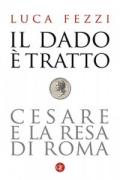Il dado è tratto

In January 49 BC, Caesar, conqueror of the Gauls, challenged a senatorial ultimatum. At the head of some legionary cohorts he crossed the Rubicon, pronouncing a famous phrase. On the same day he occupied Rimini, a strategic garrison of the italic land. He then went towards south, threatening Rome itself, the heart of a res publica hegemon on the Mediterranean.
Pompeo, in charge of stopping it, responded with a less famous but equally fateful move. He ordered to the entire political class to leave the city and follow him, to counterattack from the southern peninsula or even from the Balkans.
The panic was unspeakable. Never had the Romans been faced with such a situation. Rome, in its centuries-old history, had always been defended, with mixed fortunes, from external and internal enemies. To Caesar it was instead abandoned, together with its very rich treasure.
What happened in those terrible days? How did it come to such a puzzling situation? Was Rome really indefensible? What were the consequences of the escape of Pompeo? To answer it, we need to reconstruct the political and institutional climate that had transformed the glorious res publica into a worn-out and corrupt system, in which too many no longer believed, and which Caesar managed to bend with impressive speed.